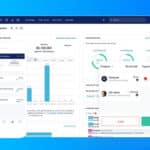With the development trend of global big data, all walks of life have begun to implement “digital transformation”, hoping to improve business opportunities and management efficiency. Among them, the B2B sales model has moved towards digitization and automation.
However, in Hong Kong, many large-scale enterprises still use traditional manual methods to manage their relationships with customers, such as using spreadsheets (Spreadsheets) such as Excel or Google Sheets to input and store data. There are many problems derived from these methods, which not only affect the work efficiency of employees, but also affect the company’s marketing (Marketing) performance and slow down performance progress.
To solve these problems, companies need a centralized CRM system to manage customer relationships. A good CRM system can help you understand customer background, purchase records and usage status, etc., allowing you to clearly understand each stage of the “Customer Journey” and be fully prepared to leave Hong Kong!
What is a CRM system?
CRM system (Customer Relationship Management) is an automated system that manages the relationship between enterprises and customers, which means that enterprises can manage the relationship between enterprises and customers in the same system. Manage customer profiles online and analyze relevant data to set up personalized marketing and sales campaigns on the same platform.
Reference article: Customer Relationship What are the benefits of managing a CRM system?
After acquiring new customers, you can conduct data analysis again, such as the source of the customers (such as natural search, Google advertising), EDM Marketing’s email click-through rate and reply rate, etc., to prepare for future business strategies.
Many CRM systems also allow you to link to other applications you are using (such as MailChimp and WhatsApp), integrating and connecting all data in one stop, and gaining insights into more business possibilities, such as automating customer service processes.
Compared with local CRM systems, cloud CRM systems that are SaaS (software as a service) do not require costly installation, maintenance, and upgrades – you only need a simple mobile device to access the CRM system anytime, anywhere. For post-epidemic situations It’s even more convenient for employees working from home.
Want to know whether a CRM system can meet your business needs?
Have a free 15-minute online/telephone consultation with our CRM experts!
The uses and benefits of cloud CRM systems
Stronger customer relationships
The cost for a company to acquire a new customer is five times that of retaining an existing customer. CRM can comprehensively grasp the intentions of customers from the time they first contact them, which is of great help to them in implementing each consumption decision.
CRM systems allow companies to spend less time on administrative work, while at the same time making marketing more accurate and closing more deals through more in-depth data analysis. In terms of company profitability, employee efficiency and customer experience, using a CRM system is superior to the traditional model.
Higher information transparency
In the past, customer information was often scattered in different places, such as in employee email boxes, files, or even retained by retired employees, all lacking systematic management. Using a CRM system can ensure that everyone updates and analyzes customer data on the same platform, helping various departments to understand transaction progress and business status, and increasing the transparency of information flow. You can also set different usage permissions to meet the needs of different departments or employees.
Enterprises can also integrate their WhatsApp Business account into the CRM system, and the CRM system will automatically record and update customer information. Just set the conditions in advance, and the CRM system will automatically send messages to qualified customers, saving you time on manual input and proofreading.
More detailed planning data analysis
After establishing a Marketing Campaign, the company can track the click-through rate, browsing time and conversion rate (Conversion) of each campaign in the CRM system ), helping to adjust and improve plans in a timely manner to achieve better results.




